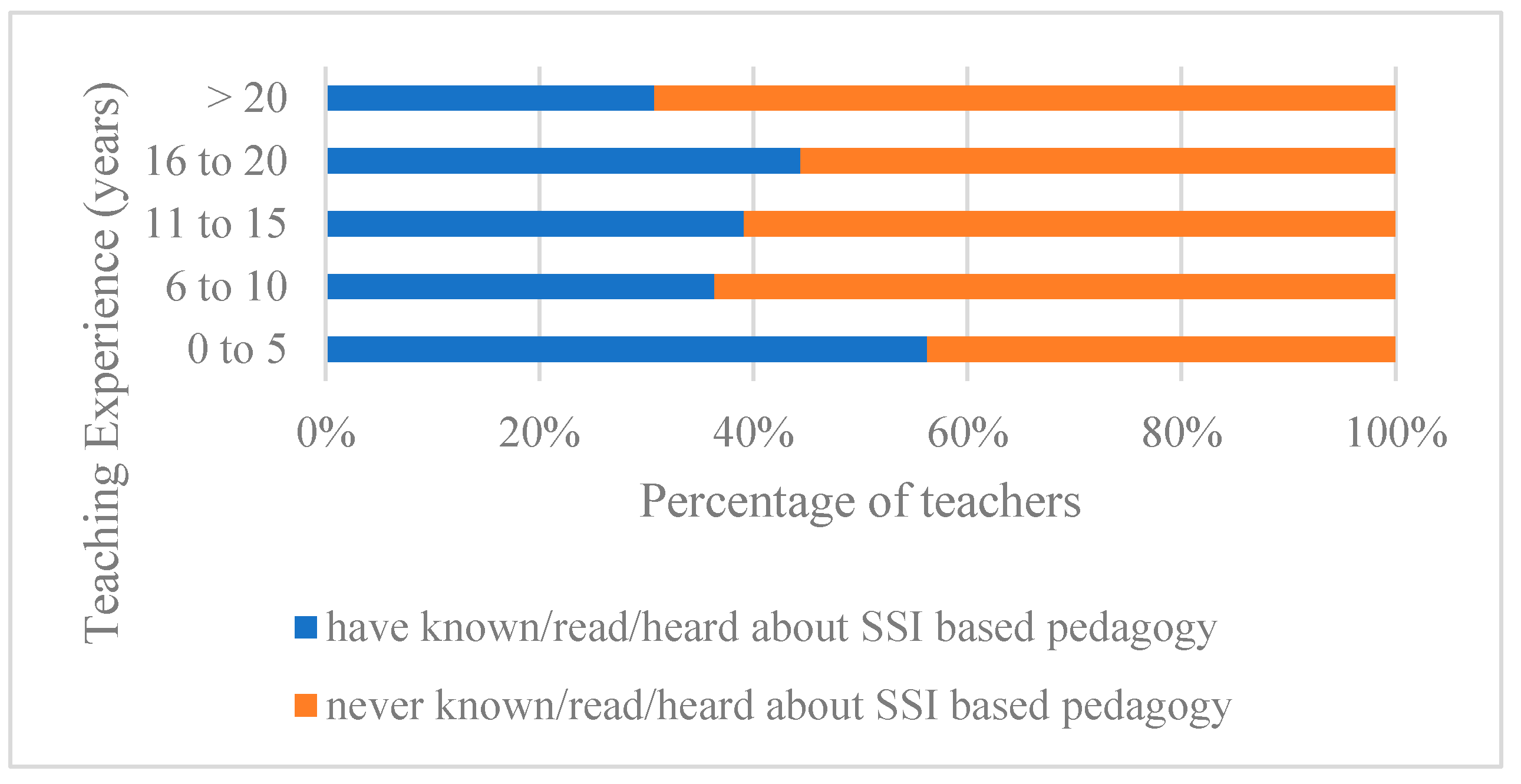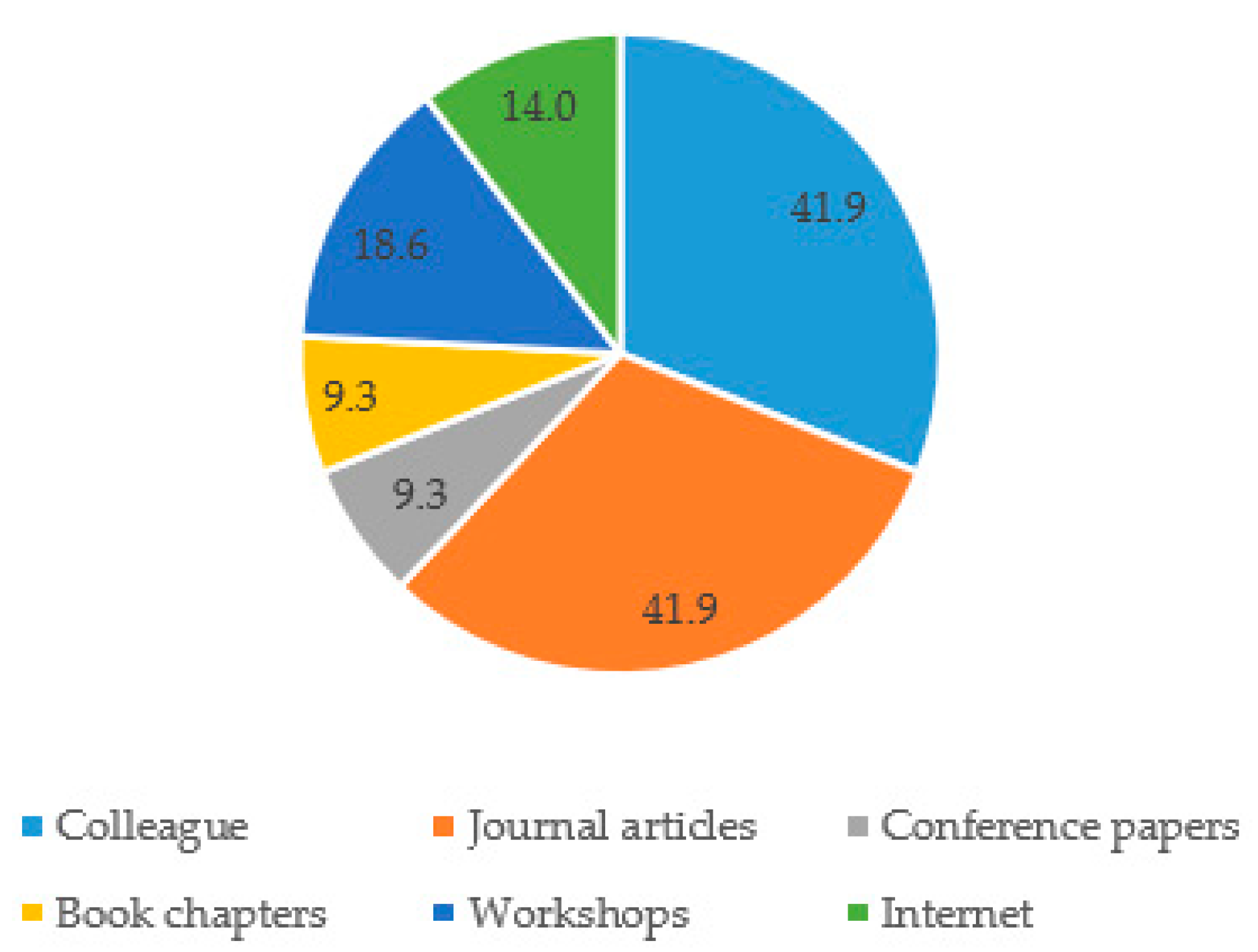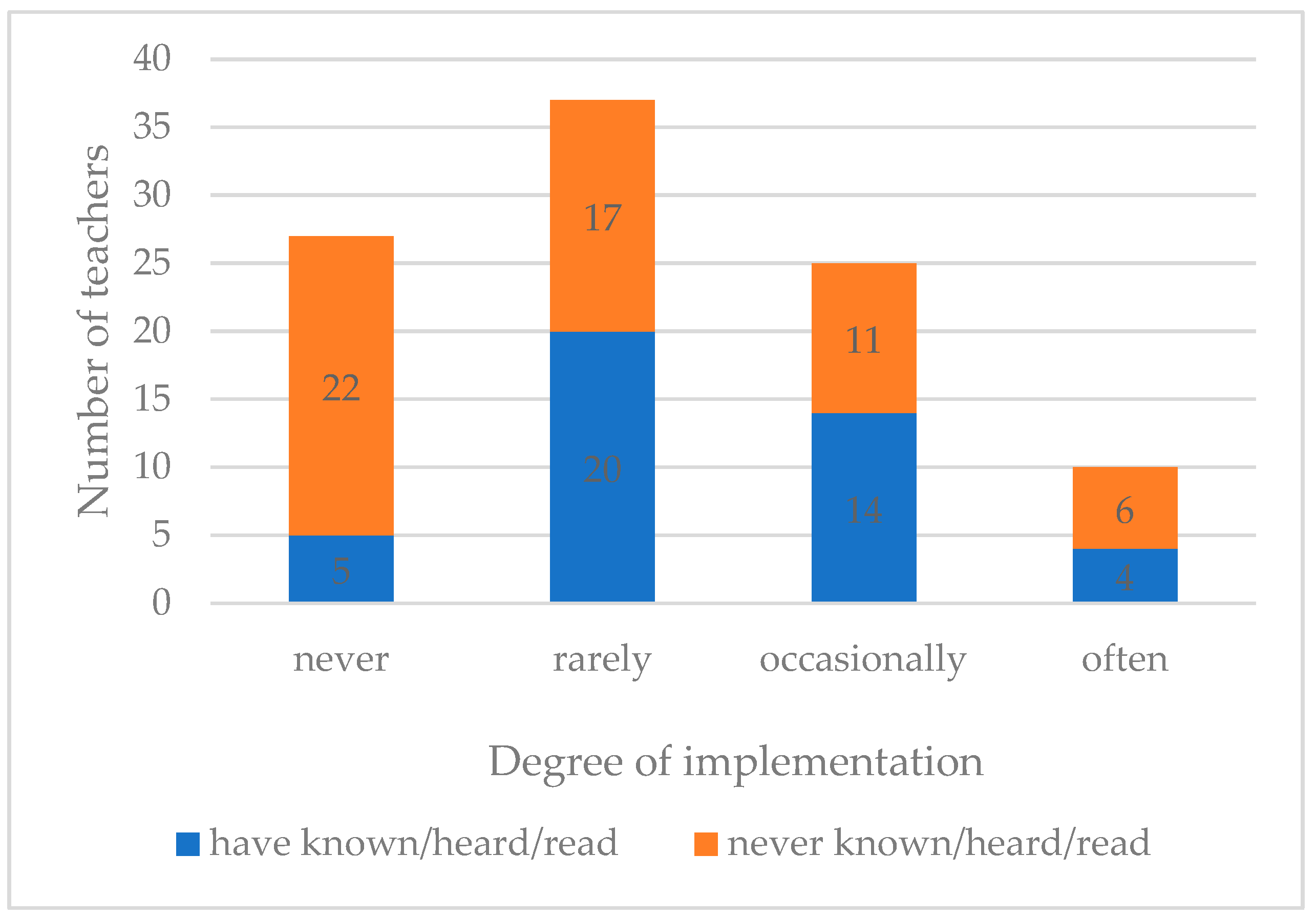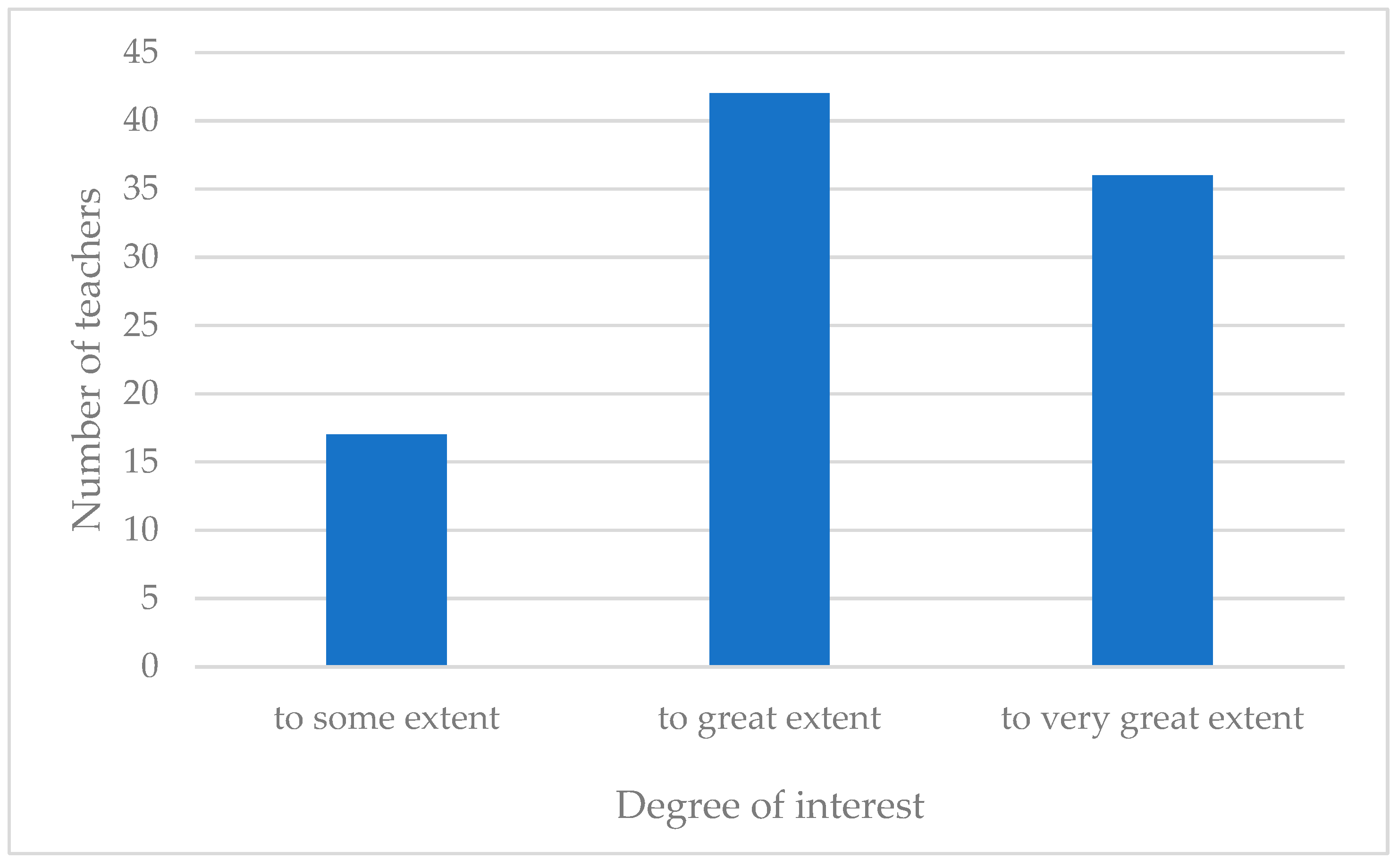A Survey of Indonesian Science Teachers’ Experience and Perceptions toward Socio-Scientific Issues-Based Science Education
Abstract
1. Introduction
1.1. Background
1.2. Theoretical Framework
- Do Indonesian junior secondary science teachers incorporate SSI-based instruction in their teaching practices?
- What are Indonesian junior secondary science teachers’ views about incorporating SSI-based instruction in their classes?
2. Materials and Methods
2.1. Participants
2.2. Questionnaire
- (1)
- The teachers’ familiarity (whether or not they have known/heard/read something) with SSI-based pedagogies
- (2)
- Their source(s) of information,
- (3)
- How often they had implemented SSI-based teaching,
- (4)
- Any suggested challenges in implementing SSI-based teaching,
- (5)
- Any student competencies that might be boosted by using a corresponding approach,
- (6)
- Any teacher skills that can be developed,
- (7)
- To what extent SSI-based teaching can contribute to character formation,
- (8)
- Which aspects of character formation can be most significantly supported,
- (9)
- Suggested science topics useful for implementing SSI-based teaching,
- (10)
- To what extent the teacher remained interested in implementing SSI-based teaching in spite of any suggested challenges.
2.3. Analysis
3. Results
3.1. Teachers’ Experiences Regarding SSI-Based Teaching
3.2. Teachers’ Perceptions Regarding SSI-Based Science Education
4. Discussion
5. Conclusions
6. Limitations
Author Contributions
Funding
Conflicts of Interest
References
- Stuckey, M.; Hofstein, A.; Mamlok-Naaman, R.; Eilks, I. The meaning of ‘relevance’ in science education and its implications for the science curriculum. Stud. Sci. Educ. 2013, 49, 1–34. [Google Scholar] [CrossRef]
- Sjöström, J.; Eilks, I. Reconsidering different visions on scientific literacy and science education based on the concept of bildung. In Cognition, Metacognition, and Culture in STEM Education; Dori, Y.J., Mevarech, Z.R., Baker, D.R., Eds.; Springer: Cham, Switzerland, 2018; Volume 24, pp. 65–88. [Google Scholar]
- Roberts, D.A. Scientific literacy/science literacy. In Handbook of Research on Science Education; Abell, S.K., Lederman, N.G., Eds.; Lawrence Erlbaum: Mahwah, NJ, USA, 2007; pp. 729–780. [Google Scholar]
- Argina, A.W.; Mitra, D.; Ijabah, N.; Setiawan, R. Indonesian PISA Result: What Factors and What Should be Fixed. In Proceedings of the 1st Education and Language International Conference, Semarang, Indonesia, 10–11 February 2017; Available online: http://jurnal.unissula.ac.id/index.php/ELIC/article/view/1212 (accessed on 2 April 2019).
- Sadler, T.D. Informal reasoning regarding socioscientific issues: A critical review of research. J. Res. Sci. Teach. 2004, 41, 513–536. [Google Scholar] [CrossRef]
- Zeidler, D.L.; Lewis, J. Unifying themes in moral reasoning on socioscientific issues and discourse. In The Role of Moral Reasoning and Discourse in Science Education; Zeidler, D.L., Ed.; Kluwer: Dordrecht, The Netherlands, 2003; pp. 289–306. [Google Scholar]
- Sadler, T.D. Situating socioscientific issues in classrooms as a means of achieving goals of science education. In Socio-Scientific Issues in the Classroom: Teaching, Learning and Research; Sadler, T.D., Ed.; Springer: Dordrecht, The Netherlands, 2011; pp. 1–9. [Google Scholar]
- Sadler, T.D. Situated learning in science education: Socio-scientific issues as contexts for practice. Stud. Sci. Educ. 2009, 45, 1–42. [Google Scholar] [CrossRef]
- Childs, P.E.; Hayes, S.M.; O’Dwyer, A. Chemistry and everyday life: Relating secondary school chemistry to the current and future lives of students. In Relevant Chemistry Education: From Theory to Practice; Eilks, I., Hofstein, A., Eds.; Sense: Rotterdam, The Netherlands, 2015; pp. 33–54. [Google Scholar]
- Eilks, I.; Rauch, F.; Ralle, B.; Hofstein, A. How to allocate the chemistry curriculum between science and society. In Teaching Chemistry: A Studybook; Eilks, I., Hofstein, A., Eds.; Sense: Rotterdam, The Netherlands, 2013; pp. 1–36. [Google Scholar]
- Hofstein, A.; Eilks, I.; Bybee, R. Societal issues and their importance for contemporary science education—A pedagogical justification and the state-of-the-art in Israel, Germany, and the USA. Int. J. Sci. Math. Educ. 2011, 9, 1459–1483. [Google Scholar] [CrossRef]
- Subiantoro, A.W. Promoting Socio-Scientific Issues-Based Learning in Biology: Indonesian Students’ and Teacher’s Perceptions and Students’ Informal Reasoning. Ph.D. Thesis, Curtin University, Bentley, Australia, May 2017. [Google Scholar]
- Zeidler, D.L. Socioscientific issues. In Encyclopedia of Science Education; Gunstone, R., Ed.; Springer: Dordrecht, The Netherlands, 2015; pp. 998–1003. [Google Scholar]
- Marks, R.; Eilks, I. Promoting scientific literacy using a sociocritical and problem-oriented approach to chemistry teaching: Concept, examples, experiences. Int. J. Environ. Sci. Educ. 2009, 4, 231–245. [Google Scholar]
- Marks, R.; Bertram, S.; Eilks, I. Learning chemistry and beyond with a lesson plan on potato crisps, which follows a socio-critical and problem-oriented approach to chemistry lessons—A case study. Chem. Educ. Res. Pract. 2008, 9, 267–276. [Google Scholar] [CrossRef]
- Eilks, I.; Marks, R.; Feierabend, T. Science education research to prepare future citizens—Chemistry learning in a socio-critical and problem-oriented approach. In Promoting Successful Science Education; Ralle, B., Eilks, I., Eds.; Shaker: Aachen, Germany, 2008; pp. 75–86. [Google Scholar]
- Feierabend, T.; Eilks, I. Raising students’ perception of the relevance of science teaching and promoting communication and evaluation capabilities using authentic and controversial socio-scientific issues in the framework of climate change. Sci. Educ. Int. 2010, 21, 176–196. [Google Scholar]
- Feierabend, T.; Eilks, I. Teaching the societal dimension of chemistry using a socio-critical and problem-oriented lesson plan based on bioethanol usage. J. Chem. Educ. 2011, 88, 1250–1256. [Google Scholar] [CrossRef]
- Zeidler, D.L.; Keefer, M. The role of moral reasoning and the status of socioscientific issues in science education. In The Role of Moral Reasoning and Discourse in Science Education; Zeidler, D.L., Ed.; Kluwer: Dordrecht, The Netherlands, 2003; pp. 7–40. [Google Scholar]
- Abd-El-Khalick, F. Socioscientific issues in pre-college science classrooms: The primacy of learners’ epistemological orientations and views of nature of science. In The Role of Moral Reasoning on Socioscientific Issues and Discourse in Science Education; Zeidler, D.L., Ed.; Kluwer: Dordrecht, The Netherlands, 2003; pp. 41–62. [Google Scholar]
- Zeidler, D.L.; Sadler, T.D. The role of moral reasoning in argumentation: Conscience, character, and care. In Argumentation in Science Education: Perspectives from Classroom-Based Research; Erduran, S., Jimenez-Aleizandre, M.P., Eds.; Springer: Dordrecht, The Netherlands, 2007; pp. 201–216. [Google Scholar]
- Eilks, I.; Hofstein, A. Combining the question of the relevance of science education with the idea of education for sustainable development. In Science Education Research and Education for Sustainable Development; Eilks, I., Markic, S., Ralle, B., Eds.; Shaker: Aachen, Germany, 2014; pp. 3–14. [Google Scholar]
- Lee, H.; Abd-El-Khalick, F.; Choi, K. Korean science teachers’ perceptions of the introduction of socio-scientific issues into the science curriculum. Can. J. Sci. Math. Tech. Educ. 2006, 6, 97–117. [Google Scholar] [CrossRef]
- Bossér, U.; Lundin, M.; Lindahl, M. Challenges faced by teachers implementing socio-scientific issues as core elements in their classroom practices. Eur. J. Sci. Math. Educ. 2015, 3, 159–176. [Google Scholar]
- Lee, H.; Chang, H. Exploration of experienced science teachers’ personal practical knowledge of teaching socioscientific issues (SSI). J. Korean Assoc. Sci. Educ. 2010, 30, 353–365. [Google Scholar]
- Yang, J.; Kim, H.; Gao, L.; Kim, E.; Kim, S.; Lee, H. Perceptions of science teachers on socioscientific issues as an instructional tool for creativity and character education. J. Korean Assoc. Sci. Educ. 2012, 32, 113–128. [Google Scholar] [CrossRef]
- Mayring, P. Qualitative Content Analysis: Theoretical Foundation, Basics Procedures and Software Solution; Social Science Open Access Repository: Klagenfurt, Austria, 2014; Available online: https://nbn-resolving.org/urn:nbn:de:0168-ssoar-395173 (accessed on 7 April 2019).
- Ekborg, M.; Ottander, C.; Silfve, E. Teachers’ experience of working with socio-scientific issues: A large scale and in depth study. Res. Sci. Educ. 2013, 43, 599–617. [Google Scholar] [CrossRef]
- Holbrook, J.; Rannikmae, M. The nature of science education for enhancing scientific literacy. Int. J. Sci. Educ. 2007, 29, 1347–1362. [Google Scholar] [CrossRef]
- Chung, Y.; Yoo, J.; Kim, S.-W.; Lee, H.; Zeidler, D.L. Enhancing students’ communication skills in the science classroom through socioscientific issue. Int. J. Sci. Math. Educ. 2016, 14, 1–27. [Google Scholar] [CrossRef]
- Simon, S.; Amos, R. Decision making and use of evidence in a socio-scientific problem on air quality. In Socio-Scientific Issues in the Classroom; Sadler, T.D., Ed.; Springer: Dordrecht, The Netherlands, 2011; pp. 167–192. [Google Scholar]
- Rahayu, S.; Setyaningsih, A.; Astarina, A.D.; Fathi, N. High school students’ attitudes about socioscientific issues contextualized in inquiry-based chemistry instruction. In Proceedings of the 2nd International Conference on Education and Multimedia Technology, Okinawa, Japan, 2–4 July 2018. [Google Scholar]
- Presley, M.L.; Sickel, A.J.; Muslu, N.; Merle-Johnson, D.; Witzig, S.B.; Izci, K.; Sadler, T.D. A framework for socio-scientific issues based education. Sci. Educ. 2013, 22, 27–32. [Google Scholar]
- Brookhart, S.M. How to Assess Higher-Order Thinking Skills in Your Classroom; ASCD: Alexandria, VA, USA, 2010. [Google Scholar]
- Dawson, V.M. A case study of the impact of introducing socio-scientific issues into a reproduction unit in a Catholic girls’ school. In Socio-Scientific Issues in the Classroom: Teaching, Learning and Research; Sadler, T.D., Ed.; Springer: Dordrecht, The Netherlands, 2011; pp. 313–346. [Google Scholar]
- Eastwood, J.L.; Schlegel, W.M.; Cook, K.L. Effects of an interdisciplinary program on students’ reasoning with socioscientific issues and perceptions of their learning experience. In Socio-Scientific Issues in the Classroom: Teaching, Learning and Research; Sadler, T.D., Ed.; Springer: Dordrecht, The Netherlands, 2011; pp. 89–126. [Google Scholar]
- Zeidler, D.L.; Applebaum, S.M.; Sadler, T.D. Enacting a socioscientific issues classroom: Transformative transformation. In Socio-Scientific Issues in the Classroom: Teaching, Learning and Research; Sadler, T.D., Ed.; Springer: Dordrecht, The Netherlands, 2011; pp. 277–306. [Google Scholar]
- Sadler, T.D. Socio-scientific issues-based education: What we know about science education in the context of SSI. In Socio-Scientific Issues in the Classroom: Teaching, Learning and Research; Sadler, T.D., Ed.; Springer: Dordrecht, The Netherlands, 2011; pp. 355–369. [Google Scholar]
- Cromley, J.G. Reading achievement and science proficiency: International comparisons from the Programme on International Student Assessment. Read. Psych. 2009, 30, 89–118. [Google Scholar] [CrossRef]
- OECD. Learning for Tomorrow’s World: First Results from PISA 2003; OECD: Paris, France, 2004; Available online: https://www.oecd.org/education/school/programmeforinternationalstudentassessmentpisa/34002216.pdf (accessed on 7 April 2019).
- OECD. PISA 2006 Science Competencies for Tomorrow’s World (Volume I): Analysis; OECD: Paris, France, 2007; Available online: https://www.oecd-ilibrary.org/education/pisa-2006_9789264040014-en (accessed on 7 April 2019).
- OECD. PISA 2009 Result: Executive Summary; OECD: Paris, France, 2010. Available online: https://www.oecd.org/pisa/pisaproducts/46619703.pdf (accessed on 7 April 2019).
- OECD. PISA 2012 Results: What Students Know and Can Do—Students Performance in Mathematics, Reading, and Science, Revised Edition; PISA, OECD Publishing: Paris, France, 2014; Volume I. [Google Scholar] [CrossRef]
- OECD. PISA 2015 Result (Volume V): Collaborative Problem Solving; OECD: Paris, France, 2017; Available online: https://www.oecd-ilibrary.org/education/pisa-2015-results-volume-v_9789264285521-en (accessed on 7 April 2019).
- Fogleman, J.; McNeill, K.L.; Krajcik, J. Examining the effect of teachers’ adaptations of a middle school science inquiry-oriented curriculum unit on student learning. J. Res. Sci. Teach. 2011, 48, 149–169. [Google Scholar] [CrossRef]
- Dittmar, J.; Eilks, I. Secondary school students and internet forums—A survey of student views contrasted with an analysis of internet forum posts. Educ. Sci. 2019, 9, 121. [Google Scholar] [CrossRef]
- Mamlok-Naaman, R.; Eilks, I.; Bodner, G.; Hofstein, A. Professional Development of Chemistry Teachers: Theory and Practice; RSC Publishing: Croydon, UK, 2018. [Google Scholar]





| Aspect | Profile | Number of Teachers |
|---|---|---|
| Educational background | Bachelor’s degree (99) in: | |
| Biology | 19 | |
| Biology education | 36 | |
| Chemistry | 5 | |
| Chemistry education | 2 | |
| Physics | 8 | |
| Physics education | 22 | |
| Science education | 7 | |
| Master’s degree (38) in: | ||
| Biology education | 2 | |
| Physics education | 22 | |
| Science education | 4 | |
| Social education | 1 | |
| Management | 5 | |
| Chemistry | 1 | |
| Chemistry education | 1 | |
| Educational policy and development | 2 | |
| School type | Private junior secondary school | 31 |
| Public junior secondary school | 59 | |
| Teachers who did not specify the school affiliation | 9 | |
| Teaching experience | 0–5 years | 32 |
| 6–10 years | 22 | |
| 11–15 years | 23 | |
| 16–20 years | 9 | |
| More than 20 years | 13 |
| No. | Competence | Description | % |
|---|---|---|---|
| 1. | Communication | Any response related to students’ ability in communication, argumentation, discussion, or debate | 33.3 |
| 2. | Problem-solving | Any response related to problem-solving | 32.3 |
| 3. | Critical thinking | Any response related to critical thinking, reflection, or decision-making processes | 23.2 |
| 4. | Scientific inquiry | Any response related to skills needed to conduct scientific inquiry | 21.2 |
| 5. | Social and environmental awareness | Any response related to awareness of the environment or problems faced by the society | 14.1 |
| 6. | Literacy | Any response related to literacy (reading, science literacy, scientific literacy) | 12.1 |
| 7. | Higher-order thinking | Any response that covers higher-order thinking skills based on Bloom’s taxonomy | 12.1 |
| 8. | Creativity | Any response related to creativity | 11.1 |
| 9. | Integrating science–technology–society | Any response regarding the ability to integrate science with life, technology, or society | 10.1 |
| 10. | Collaboration | Any response about working together/collaboration | 8.1 |
| No. | Category | Description | % |
|---|---|---|---|
| 1. | Designing innovative contextualized learning | Any response related to integrating daily life contexts to design and develop innovative science teaching | 45.5 |
| 2. | Teaching skills | Any response related to teaching skills, including the ability to organize classes, manage time, etc. | 24.2 |
| 3. | Interdisciplinary knowledge | Any response related to enhancing interdisciplinary knowledge, getting up-to-date information, etc. | 12.1 |
| 4. | Utilizing varied learning sources | Any response related to organizing, utilizing, designing, or developing various learning sources | 11.1 |
| 5. | Making authentic assessment | Any response regarding comprehensive assessments that cover all dimensions of learning | 8.1 |
| 6. | Motivating students | Any response related to teachers’ ability to motivate students to be more engaged in learning | 8.1 |
| 7. | Critical thinking | Any response related to critical or reflexive thinking | 7.1 |
| No. | Category | Description | % |
|---|---|---|---|
| 1. | Environmental and social awareness | Any response related to awareness of the environment, nature or society | 34.3 |
| 2. | Open-mindedness/respectfulness | Any response related to being open-minded and respecting other individuals or groups | 15.2 |
| 3. | Responsibility | Any response related to decision-making or taking action in a responsible manner | 12.1 |
| 4. | Collaboration | Any response related to working together or collaboration | 11.1 |
| 5. | Critical thinking | Any response related to critical or reflexive thinking | 9.1 |
| 6. | Good attitudes | Any response that shows implementation of positive attitudes in a general sense | 9.1 |
| 7. | Considering values | Any response related to considering values, such as religious or cultural beliefs, ethical considerations, norms | 6.1 |
| No. | Topic | % |
|---|---|---|
| 1. | Environmental pollution | 87.9 |
| 2. | Food biotechnology | 81.8 |
| 3. | Global warming | 77.8 |
| 4. | Addictive substances and additives | 74.8 |
| 5. | Green technology | 73.7 |
| 6. | Civilization and environment | 50.5 |
| 7. | Interaction of living things and the environment | 47.5 |
| 8. | Heredity | 43.4 |
| 9. | Soil and life sustainability | 43.4 |
| 10. | Energy and life systems | 41.4 |
| 11. | The human reproductive system | 41.4 |
| No. | Category | Description | % |
|---|---|---|---|
| 1. | Lack of student competencies | Any response related to students’ lack of abilities/competencies/skills | 32.3 |
| 2. | Lack of teachers’ expertise | Any response related to the teacher’s lack of knowledge, experience, and expertise | 26.3 |
| 3. | Content in the curriculum | Any response related to the nature of the content in the curriculum or emphasis on teaching the content | 25.3 |
| 4. | Lack of facilities | Any response related to facilities, including missing learning resources, or media | 17.2 |
| 5. | Lack of time | Any response related to limited time | 13.1 |
© 2020 by the authors. Licensee MDPI, Basel, Switzerland. This article is an open access article distributed under the terms and conditions of the Creative Commons Attribution (CC BY) license (http://creativecommons.org/licenses/by/4.0/).
Share and Cite
Nida, S.; Rahayu, S.; Eilks, I. A Survey of Indonesian Science Teachers’ Experience and Perceptions toward Socio-Scientific Issues-Based Science Education. Educ. Sci. 2020, 10, 39. https://doi.org/10.3390/educsci10020039
Nida S, Rahayu S, Eilks I. A Survey of Indonesian Science Teachers’ Experience and Perceptions toward Socio-Scientific Issues-Based Science Education. Education Sciences. 2020; 10(2):39. https://doi.org/10.3390/educsci10020039
Chicago/Turabian StyleNida, Safwatun, Sri Rahayu, and Ingo Eilks. 2020. "A Survey of Indonesian Science Teachers’ Experience and Perceptions toward Socio-Scientific Issues-Based Science Education" Education Sciences 10, no. 2: 39. https://doi.org/10.3390/educsci10020039
APA StyleNida, S., Rahayu, S., & Eilks, I. (2020). A Survey of Indonesian Science Teachers’ Experience and Perceptions toward Socio-Scientific Issues-Based Science Education. Education Sciences, 10(2), 39. https://doi.org/10.3390/educsci10020039






